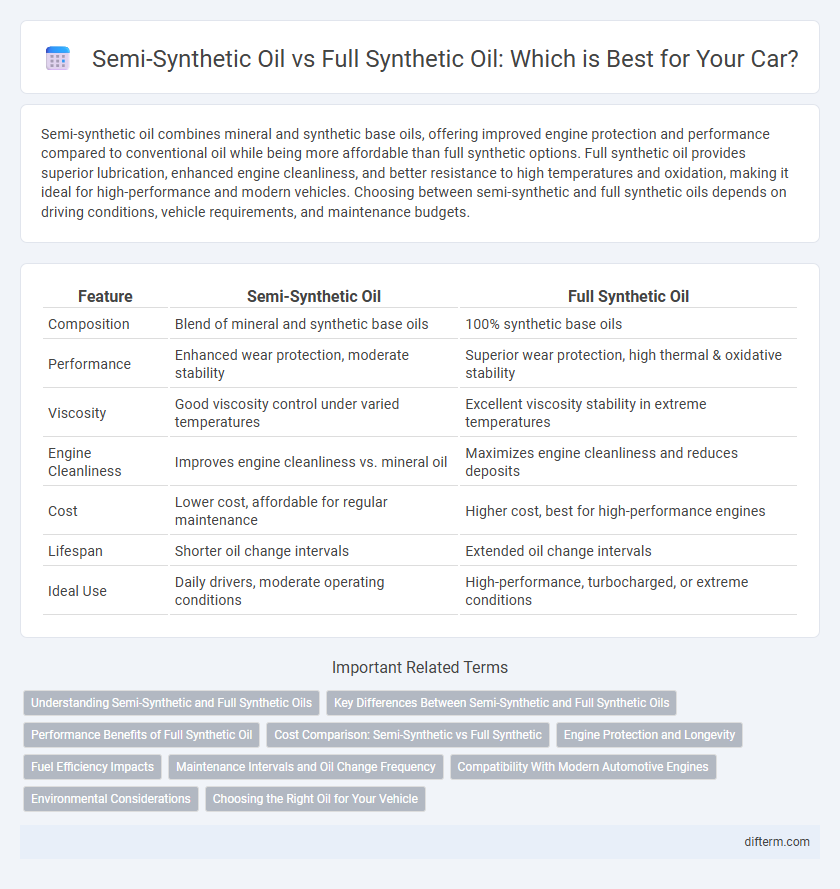Semi-synthetic oil combines mineral and synthetic base oils, offering improved engine protection and performance compared to conventional oil while being more affordable than full synthetic options. Full synthetic oil provides superior lubrication, enhanced engine cleanliness, and better resistance to high temperatures and oxidation, making it ideal for high-performance and modern vehicles. Choosing between semi-synthetic and full synthetic oils depends on driving conditions, vehicle requirements, and maintenance budgets.
Table of Comparison
| Feature | Semi-Synthetic Oil | Full Synthetic Oil |
|---|---|---|
| Composition | Blend of mineral and synthetic base oils | 100% synthetic base oils |
| Performance | Enhanced wear protection, moderate stability | Superior wear protection, high thermal & oxidative stability |
| Viscosity | Good viscosity control under varied temperatures | Excellent viscosity stability in extreme temperatures |
| Engine Cleanliness | Improves engine cleanliness vs. mineral oil | Maximizes engine cleanliness and reduces deposits |
| Cost | Lower cost, affordable for regular maintenance | Higher cost, best for high-performance engines |
| Lifespan | Shorter oil change intervals | Extended oil change intervals |
| Ideal Use | Daily drivers, moderate operating conditions | High-performance, turbocharged, or extreme conditions |
Understanding Semi-Synthetic and Full Synthetic Oils
Semi-synthetic oil combines conventional mineral oil with synthetic base oils, offering improved performance and protection compared to standard mineral oils, especially in moderate driving conditions. Full synthetic oil is engineered with highly refined base oils and advanced additives, providing superior engine protection, enhanced viscosity stability, and better performance in extreme temperatures and high-stress environments. Choosing between semi-synthetic and full synthetic oils depends on the vehicle's manufacturer recommendations, driving habits, and the level of engine protection desired.
Key Differences Between Semi-Synthetic and Full Synthetic Oils
Semi-synthetic oil combines mineral oil with synthetic base stocks, offering enhanced protection and performance over conventional oils but with fewer additives and lower refinement compared to full synthetic oil. Full synthetic oil is engineered with highly refined hydrocarbons and a superior additive package, providing maximum engine protection, better viscosity stability, and improved performance in extreme temperatures. Key differences include better oxidation resistance, longer oil change intervals, and superior engine cleanliness in full synthetic oils compared to semi-synthetic blends.
Performance Benefits of Full Synthetic Oil
Full synthetic oil offers superior engine performance by providing enhanced lubrication and better thermal stability compared to semi-synthetic oil. It reduces engine wear under extreme temperatures, resulting in improved fuel efficiency and prolonged engine life. Advanced additive packages in full synthetic oil also ensure cleaner engine operation by minimizing deposits and sludge buildup.
Cost Comparison: Semi-Synthetic vs Full Synthetic
Semi-synthetic oil offers a cost-effective solution by blending mineral and synthetic base oils, making it significantly cheaper than full synthetic oil while still providing better protection than conventional oils. Full synthetic oil, though more expensive, delivers superior engine performance, enhanced viscosity stability, and longer oil change intervals, which can offset initial higher costs over time. Choosing between the two depends on balancing upfront price against long-term engine care and efficiency benefits.
Engine Protection and Longevity
Semi-synthetic oil combines mineral and synthetic base oils, offering improved engine protection compared to conventional oils but less than full synthetic oils, which provide superior resistance to thermal breakdown and oxidation. Full synthetic oil enhances engine longevity by maintaining optimal viscosity and reducing wear under extreme temperatures and high-stress conditions. Studies show engines using full synthetic oils experience fewer deposits and longer intervals between oil changes, resulting in extended engine life and better overall performance.
Fuel Efficiency Impacts
Semi-synthetic oil offers improved fuel efficiency compared to conventional oils by reducing engine friction, but full synthetic oil provides superior fuel economy benefits due to its advanced molecular uniformity and enhanced lubrication properties. Full synthetic oils maintain optimal viscosity across a wider temperature range, ensuring consistent engine performance and lower fuel consumption under extreme conditions. Vehicles running on full synthetic oil typically experience better miles per gallon (MPG), contributing to cost savings and reduced emissions over time.
Maintenance Intervals and Oil Change Frequency
Semi-synthetic oil typically requires oil changes every 5,000 to 7,500 miles, balancing cost and moderate engine protection. Full synthetic oil extends maintenance intervals up to 10,000 to 15,000 miles due to superior thermal stability and oxidation resistance. Choosing full synthetic oil optimizes oil change frequency and improves overall engine longevity in modern vehicles.
Compatibility With Modern Automotive Engines
Semi-synthetic oil blends mineral oil with synthetic base stocks, offering adequate protection and compatibility for moderately modern automotive engines. Full synthetic oil provides superior thermal stability, oxidation resistance, and lubrication, making it ideal for high-performance and turbocharged modern engines. Engine manufacturers often recommend full synthetic oil for advanced fuel injection and emission systems to maintain optimal engine efficiency and longevity.
Environmental Considerations
Semi-synthetic oil blends mineral and synthetic base oils, offering moderate environmental benefits by extending oil change intervals and reducing waste compared to conventional oils. Full synthetic oil provides superior engine protection and enhanced fuel efficiency, resulting in lower emissions and less environmental impact over time. Choosing full synthetic oil supports sustainability efforts by minimizing engine wear and optimizing performance, thereby reducing overall carbon footprint.
Choosing the Right Oil for Your Vehicle
Choosing the right oil for your vehicle depends on factors like driving conditions, engine type, and manufacturer recommendations. Semi-synthetic oil blends traditional mineral oil with synthetic base oils, offering improved performance and protection at a lower cost than full synthetic oils. Full synthetic oil provides superior lubrication, thermal stability, and resistance to engine wear, making it ideal for high-performance engines and extreme temperatures.
semi-synthetic oil vs full synthetic oil Infographic

 difterm.com
difterm.com